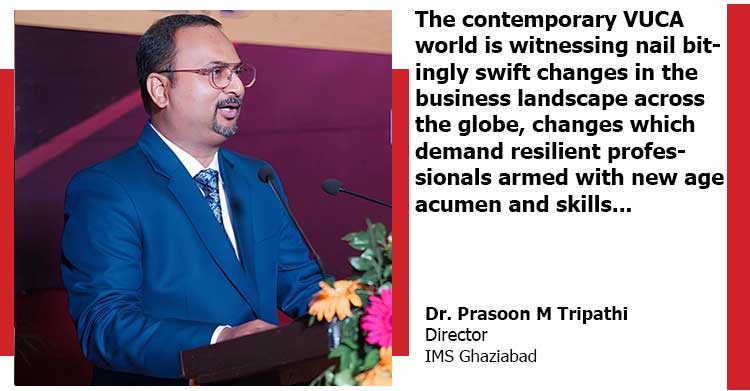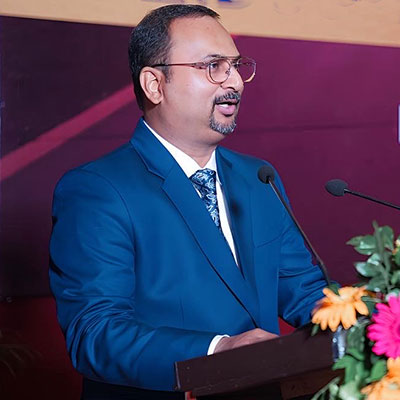Management Education for Skill Enhancement: Carving Future Ready Professionals | Dr. Prasoon M Tripathi | Director | IMS Ghaziabad

The contemporary VUCA world is witnessing nail bitingly swift changes in the business landscape across the globe, changes which demand resilient professionals armed with new age acumen and skills. In order to survive, sustain and grow in the ‘New Reality’, the leadership, strategy & culture of organizations must undergo a 360 degree
transformation.
The ongoing digital revolution has further compounded the dynamic business environment wherein latest trends like Machine Learning, Artificial Intelligence, Mechatronics, Crypto currency, NFT (Non Fungible Tokens) marketplaces, and many more have the potential to open up a vista of career opportunities. Trends like ‘Metaverse’, which might allow us or our avatars to sit alongside our colleagues stationed worldwide will change the concept of networking and teamwork phenomenally. As per KPMG 2021 CEO Outlook Pulse Survey, almost 74 percent of business leaders said that their operations have already been digitized.
These trends have far reaching implications for ‘job providers’ and ‘job seekers’ alike. For employers, the ‘work from anywhere’ revolution has provided the employers with a talent pool from across the globe where location is not much of a constraint anymore.
Companies no longer have to enter a bidding war for competent workforce in key geographies, nor do they have to incur the huge cost of relocating employees as now they have the option to source a skilled talent pool from anywhere and everywhere in the world and that too, usually at considerably lower expenses. For employees, it is
actually a double edged sword as most of the jobs of the current times will be redundant tomorrow while most of the new jobs opening up in the coming times are nonexistent today. Adding to this, in the coming years, many hundreds of millions of fresh candidates will be vying to enter the job market in a scenario of cut throat competition.
One of the most pertinent issues in this scenario is that how can a student compete realistically for new kinds of jobs, in emerging technologies, when they are devoid of the required skills? It is the prime responsibility of educators to address the myriad challenges as well as opportunities brought forth by the digital era and accordingly equip the budding professionals with the kind of skill sets imperative for their upcoming careers. The Government also expects Higher Education Institutions to carve ‘work-ready’ graduates who can contribute to the economy. Unfortunately, statistics prove that most of the current educational institutes are not preparing students adequately for the job market because excessive focus is given on academic subjects rather than emphasizing development of vocational skills. At IMS Ghaziabad, an all pervasive focus
of the legacy of 32 years has always been on teaching, training, research and consulting to equip the young minds with the skills of the 21st century workplace. In line with the need to develop efficient and trained professionals for Industry 4.0, the focus is on developing content skills, cognitive abilities, complex problem-solving ability, social skills, and environment-conscious thinking in the students.
Numerous novel and innovative initiatives for Skill Enhancement such as Value Added Certification Programmes, Value Added Short Term Training Programmes, Centre for Innovation & Entrepreneurship, Student Outreach, Competency Mapping; initiatives for developing Life skills such as Personal & Professional Skill Programs, Mentoring,
Student Psychological Counseling Program, Department Clubs; Corporate Readiness initiatives such as Placement Readiness Enhancement Program, CSR activities, Pre-Placement Preparedness Committee, Corporate Interface Series; Global Interface initiatives through Distinctive Talk Series, Global Academic Collaborations, International Study Tour; Corporate Interface Initiatives such as Corporate Development and Excellence Center, AICTE Sponsored Programmes, Conclaves and many more have been interwoven in the tapestry of the PGDM program. Based on the top ladders of Bloom’s Taxonomy, our curriculum is constantly updated in collaboration with stalwarts from industry and academia for meeting the dynamic needs of the business environment. Boosting research & quality in the system of education, the institute has collaborated with reputed national and international organizations.
In order to conquer the inevitable winds of change, the young generation must develop in themselves the crucial ability of being agile when it comes to learning and imbibing new information, knowledge and skills. Students must understand that learning agility is the burning need of the hour. By being agile, they will be competent to figure out a way through a new situation without actually knowing what to do, by intelligently using past and present experiences to make sense of an uncertain situation. Besides, it is highly imperative that the students, who are the future of our country, must spread their wings without having any boundaries, so that they can experience the vastness of their hidden potential.
More than just paying the bills, work helps in anchoring the youth of the country, and makes them feel productive and being part of something more big and meaningful than themselves. Failure to address this justified need of the young generation will undoubtedly sow the seeds of misalignment and social instability. With the rolling of the
economic engine on the road to recovery once again, higher educational institutions must rethink their critical role in carving productive and employable professionals. As organizations worldwide transition to the New Reality in the dynamic times, institutes in the domain of management education must adopt a growth mindset, a spirit of
collaboration and forward planning approach to education and skill development.
What turn will be taken by the new era in times to come is anybody’s guess, but as the world is matching pace with the acceleration, educators have to intelligently make the strategic choice between jumping off or gearing up and enjoying the ride.


